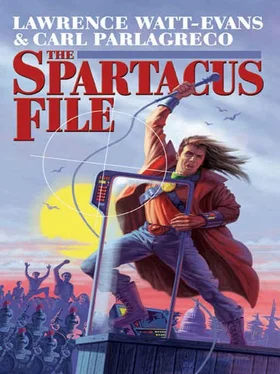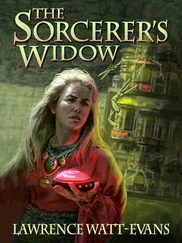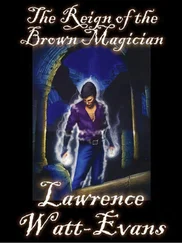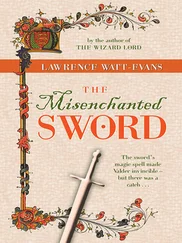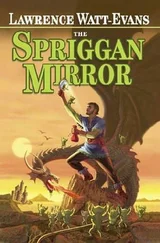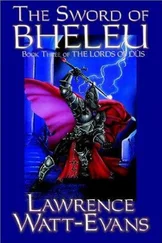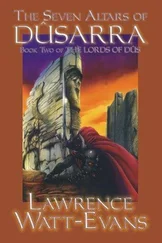Lawrence Watt-Evans - The Spartacus File
Здесь есть возможность читать онлайн «Lawrence Watt-Evans - The Spartacus File» весь текст электронной книги совершенно бесплатно (целиком полную версию без сокращений). В некоторых случаях можно слушать аудио, скачать через торрент в формате fb2 и присутствует краткое содержание. Жанр: Фантастика и фэнтези, на английском языке. Описание произведения, (предисловие) а так же отзывы посетителей доступны на портале библиотеки ЛибКат.
- Название:The Spartacus File
- Автор:
- Жанр:
- Год:неизвестен
- ISBN:нет данных
- Рейтинг книги:3 / 5. Голосов: 1
-
Избранное:Добавить в избранное
- Отзывы:
-
Ваша оценка:
- 60
- 1
- 2
- 3
- 4
- 5
The Spartacus File: краткое содержание, описание и аннотация
Предлагаем к чтению аннотацию, описание, краткое содержание или предисловие (зависит от того, что написал сам автор книги «The Spartacus File»). Если вы не нашли необходимую информацию о книге — напишите в комментариях, мы постараемся отыскать её.
The Spartacus File — читать онлайн бесплатно полную книгу (весь текст) целиком
Ниже представлен текст книги, разбитый по страницам. Система сохранения места последней прочитанной страницы, позволяет с удобством читать онлайн бесплатно книгу «The Spartacus File», без необходимости каждый раз заново искать на чём Вы остановились. Поставьте закладку, и сможете в любой момент перейти на страницу, на которой закончили чтение.
Интервал:
Закладка:
And that wasn't even counting all the little whacko political parties that the Party hadn't bothered to outlaw. The Spartacus File would see any party that had never been in power or at least held a seat in Congress-which was to say, just about any party except the Democratic-Republicans and the Greens-as either a present rebel group or a potential one.
Of course, Schiano could have pointed out Smith's error-but why should he? He didn't have anything against this Casper Beech. And Smith was an asshole.
Besides, Schiano thought, he wanted to see just what the Spartacus File could actually do.
Chapter Fourteen
The van pulled up beside them, and a flashlight shone in Casper's face; he blinked, but resisted the temptation to shield his eyes.
The light moved on to Cecelia, then to Mirim, then went out.
“I don't believe I'm really doing this,” Mirim muttered from the back seat. “I mean, why am I sitting here in a deserted parking lot in the middle of New Jersey meeting a bunch of crackpot revolutionaries?”
“Because the government is trying to kill me to cover up their own mistake,” Casper said, “and you've got the guts and the morals to join me in trying to stop them.”
“Christ, Cas, you sound like a video hero,” Cecelia replied.
The van door slammed; a thin young man in black, wearing a black ski mask, had climbed out. He came over to the Mustang; Casper rolled down the window.
“You're Beech?” the man in black asked. He did not bend down to bring his face closer; that, Casper knew, would make him too easy to grab.
“Yes,” Casper said.
“Which one's the lawyer?”
Casper jerked a thumb at Cecelia. “Ms. Grand,” he said.
“And the other? The phone call wasn't real clear.”
“Her name's Mirim Anspack,” Casper said. “She's just a friend who got caught in the crossfire.”
The man in black considered that.
“I'll vouch for her,” Beech said. “If that's worth anything.”
“It isn't,” the man in black said. He looked around at the empty parking lot-a church lot on a Tuesday night. The van and the Mustang were the only vehicles in sight.
“Get out of the car,” he said.
Casper obeyed promptly. Cecelia and Mirim were slower, but eventually all three were standing.
“You armed?”
Casper nodded.
The man in black held out a hand, and Casper handed over the Browning 9mm-the. 357 was in the glove compartment.
“I'd like it back later,” Casper said.
The man didn't answer. “What about the car?” he asked.
“Hotter than hell, I'm afraid,” Casper replied. “I took it off a man who tried to kill us this afternoon. I'd suggest running it up to New York and ditching it somewhere in the city.”
“Leave the keys,” the man said.
“They're in the ignition.”
“Get in the van.” He opened the back door of the vehicle.
“Casper, are you sure about this?” Mirim asked.
“Get in the van,” Casper said.
Reluctantly, Mirim got in the van.
Casper was fairly certain that at least half the subsequent twenty-minute drive was just misdirection and doubling back, but he didn't try to keep track. He had no intention of escaping from these people.
He'd been doing some thinking on the way here. He couldn't just hide out until the heat blew over, not after killing four feds; the heat wasn't going to blow over, ever. And he couldn't lose himself forever and create a new identity-his fingerprints and voiceprint and retinal patterns were on file, and sooner or later he'd be spotted somehow, his voice recognized on a random phone check or his style spotted on the nets.
Not to mention that he'd have to open new online accounts, and a standard background check might nail him.
So he didn't intend to hide; he intended to take the offensive, and he couldn't do that alone. These people he was meeting weren't just a temporary refuge; they were his hope for the future.
He intended to recruit them.
Bob Schiano gulped his personal caffeine-sugar mix and studied the screen.
Smith wanted him to locate Beech so that Covert could kill him, and Schiano was indeed doing his best to locate Beech, but he wasn't at all sure about this killing stuff.
It wasn't that anything in Beech's file from before the optimization made him sound especially appealing; he'd been a corporate nonentity, working at a dead-end job for an obscure member of the Consortium, with nothing of particular interest in his background. He was an orphan who had inherited his parents’ massive debts-they'd lived just long enough to be covered by the revised bankruptcy laws and Enhanced Creditor Recovery Act, so that half Beech's after-tax income went toward paying the interest on their decades-old medical and legal bills. His work performance evaluations were inconsistent-his superiors consistently rated him as “marginal,” while the actual productivity figures were well above average, and Schiano knew that that meant he was a loser, a scapegoat, someone his bosses felt free to dump on.
There were no files on his personal life-no one had cared about him enough to start one, he'd always managed to stay out of any government aid programs that would have called for evaluation of his mental or social state, and he'd never had the money for any sort of private therapy. Schiano noticed, though, that Beech had never married and had no acknowledged offspring, and had never been named in any divorce action or custodial suit. Apparently he wasn't much of a success with women, either-though he hadn't struck out completely, since he did have this lawyer, Cecelia Grand, he was seeing.
Grand had a much juicier file-lawyers got a lot more attention than liability analysts-but Schiano doubted any of it mattered. Beech wouldn't be taking Grand's advice; he'd be doing what he, in his optimized state, thought best, and he'd be taking along whoever he wanted.
Beech didn't own a car-he had once, but lost it in an insurance scam.
In fact, Beech had been dragged into court an average of once every sixteen months for his entire adult life on one petty complaint or another, and had always either lost or settled out of court, though Schiano could see no evidence that he'd ever actually been at fault.
The man was a complete and classic loser, beaten down by fortune and society, with no known talents beyond some minor skill with computers and, according to interviews with his co-workers, a decent sense of humor.
But then had come the imprint session and the subsequent optimization. For a few days nothing had changed-he'd called in sick, but that was about it.
And then Tuesday he had killed four trained assassins and escaped a government dragnet, taking along two women; he had used another assassin's own computer to get onto the net.
That last was something Smith didn't seem to have paid any attention to, but Schiano did. Beech hadn't just tied up Leonid Chernukhin and fled-or easier still, shot him and fled. Instead Beech had spent precious time on the computer, even though, from Chernukhin's account, Beech knew that Covert was after him.
He must have been after something important to him, and Schiano could guess what it was. He'd told Smith that Beech's first choice would be contacting an existing rebel organization, and Smith had dismissed the idea, but Schiano had gone through the access log for Chernukhin's machine-getting through Leonid's cheap firewall had been absurdly easy.
He couldn't tell exactly what Beech had and hadn't read, since he'd had the sense to dump the cache and erase the user log, but it certainly looked as if he'd gone through the latest information on subversives and terrorist groups.
And after that he'd headed north out of Philadelphia.
Schiano guessed that he did, indeed, plan to contact some rebel organization, somewhere in New York or New Jersey-and take it over.
Читать дальшеИнтервал:
Закладка:
Похожие книги на «The Spartacus File»
Представляем Вашему вниманию похожие книги на «The Spartacus File» списком для выбора. Мы отобрали схожую по названию и смыслу литературу в надежде предоставить читателям больше вариантов отыскать новые, интересные, ещё непрочитанные произведения.
Обсуждение, отзывы о книге «The Spartacus File» и просто собственные мнения читателей. Оставьте ваши комментарии, напишите, что Вы думаете о произведении, его смысле или главных героях. Укажите что конкретно понравилось, а что нет, и почему Вы так считаете.
